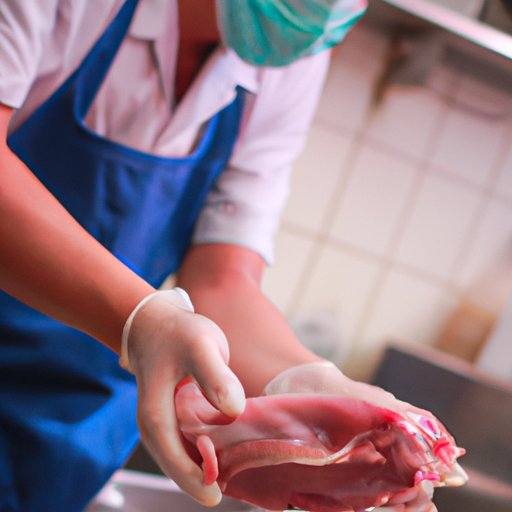Introduction
When it comes to preparing raw meat for cooking, an age-old debate continues to reign supreme: is it necessary to wash the meat before cooking? While some people are adamant that washing raw meat is a must, others feel that it is unnecessary and potentially dangerous. So what’s the truth? In this article, we will explore the question of whether chefs should wash meat before cooking and examine the risks associated with washing meat.
Debunking the Myth of Washing Meat Before Cooking
For many years, conventional wisdom has dictated that all raw meat should be washed before cooking. After all, it’s better to be safe than sorry, right? Not necessarily. Contrary to popular belief, washing raw meat is not necessary and can actually increase the risk of contamination.
The U.S. Department of Agriculture (USDA) states that there is no need to wash raw meat or poultry before cooking. This is because bacteria on the surface of the meat can easily spread to other surfaces when the meat is washed. Furthermore, the heat from cooking will kill any bacteria present on the meat.
It is important to note that unwashed meat is safe to consume, as long as it is cooked thoroughly. The USDA recommends using a food thermometer to ensure that meat is cooked to the proper internal temperature.

Reasons Why Not to Wash Meat Before Cooking
As mentioned above, washing raw meat can actually increase the risk of contamination. This is due to two primary factors: cross-contamination and bacterial spread.
Cross-contamination occurs when bacteria from the raw meat transfers to other foods or surfaces in your kitchen. This can happen when you use the same cutting board to prepare both raw and cooked food, or when you use the same utensils to handle both raw and cooked food. By washing raw meat, you run the risk of spreading bacteria to other surfaces in your kitchen.
Bacteria can also spread quickly in water. When raw meat is washed, bacteria on the surface of the meat can be transferred to the sink, faucet, and other surfaces that come into contact with the water. This increases the risk of contamination.

How Professional Chefs Handle Unwashed Meat
Although washing raw meat is not necessary, professional chefs still take steps to ensure that the meat is handled safely. This includes cleaning and sanitizing all surfaces that come into contact with raw meat, such as cutting boards, knives, and countertops. Chefs also adhere to strict food safety protocols, such as wearing gloves when handling raw meat and washing their hands after contact with uncooked food.
By following these safety protocols and taking extra precautions, professional chefs are able to serve safe, delicious meals without having to worry about washing raw meat.

Examining the Benefits of Not Washing Meat Before Cooking
In addition to reducing the risk of contamination, not washing raw meat has several other benefits. For one, it helps to retain the natural flavors and juices of the meat. When raw meat is washed, some of the flavor and moisture can be lost, resulting in a less flavorful meal.
Not washing raw meat also minimizes the risk of contamination. As mentioned earlier, washing raw meat can transfer bacteria to other surfaces in your kitchen, increasing the risk of contamination. By not washing the meat, you reduce the chance of cross-contamination.
Conclusion
In summary, washing raw meat before cooking is not necessary and can actually increase the risk of contamination. Professional chefs handle unwashed meat safely by following strict food safety protocols and taking extra precautions, such as cleaning and sanitizing all surfaces that come into contact with raw meat. Not washing raw meat also helps to retain the natural flavors and juices of the meat, as well as minimize the risk of contamination.
So the next time you prepare raw meat for cooking, remember: it’s not necessary to wash it first. Simply follow the proper food safety protocols and you’ll be able to serve a safe, delicious meal without worrying about contamination.


